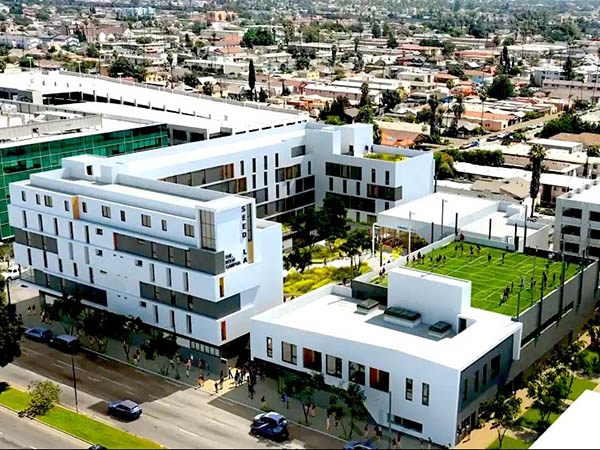The SEED LA Charter School project will be a 147,479 SF educational facility, comprising the following uses:
- 54,913 SF for classrooms, offices, and common areas
- 21,185 SF for apartment units housing 20 staff members
- 71,399 SF for 170 dormitory units housing 400 students
In this neighborhood of South Los Angeles, only 7% of the local high school students are performing at grade level in math, and between 25-30% are at grade level in language arts. Additionally, only 58% of youth in foster care graduate from high school and only 3% graduate from college, and half of all young adults who age out of foster care end up homeless or incarcerated. To address these issues, the Sponsor’s parent, SEED Foundation, has implemented an innovative model that integrates a rigorous academic program with a nurturing boarding program which currently serves 1,000 students in its three existing schools. Utilizing this model, more than 90% of SEED 9th graders graduate from high school and 94% of SEED graduates enroll in college.
In partnership with LA County’s safety-net service providers, the SEED LA Charter School will have a weighted admission lottery for foster youth, or youth who are homeless or housing insecure or have an immediate family member who is incarcerated.
SEED LA Charter School will be WASC-accredited, and all students will take the A-G coursework to attend a University of California or California State College. The project will serve 400 students, of which 50% will come from the Vermont Manchester neighborhood, where the school will be located, and 50% from throughout Los Angeles County.
Additionally, the Project is part of a 4.3-acre community development project, which includes a mixed-use development owned by Bridge Housing (adjacent to the SEED LA project). The Bridge Housing project will include 180 affordable housing units (62 one-bedroom units for persons 62 years of age or older and incomes at or below 30% of the area median income and 118 one-, two-, and three-bedroom units for individuals and families with incomes between 30% and 80% of the area median income), 50,000 SF grocery store-anchored retail, and 15,000 SF Metro transit center (including Metro’s new job training and innovation center). Per Metro’s Project Labor Agreement, SEED LA must use union labor and commit to hiring locally. The Project is located on a blighted property left vacant since the 1992 Rodney King civil unrest.


